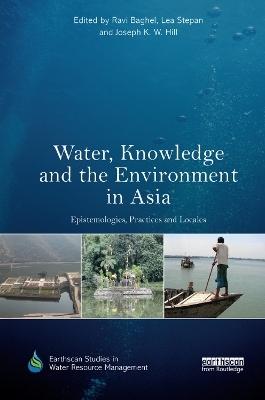
Water, Knowledge and the Environment in Asia
Routledge (Verlag)
978-0-367-33514-4 (ISBN)
The dramatic transformation of our planet by human actions has been heralded as the coming of the new epoch of the Anthropocene. Human relations with water raise some of the most urgent questions in this regard. The starting point of this book is that these changes should not be seen as the result of monolithic actions of an undifferentiated humanity, but as emerging from diverse ways of relating to water in a variety of settings and knowledge systems.
With its large population and rapid demographic and socioeconomic change, Asia provides an ideal context for examining how varied forms of knowledge pertaining to water encounter and intermingle with one another. While it is difficult to carry out comprehensive research on water knowledge in Asia due to its linguistic, political and cultural fragmentation, the topic nevertheless has relevance across boundaries. By using a carefully chosen selection of case studies in a variety of locations and across diverse disciplines, the book demonstrates commonalities and differences in everyday water practices around Asia while challenging both romantic presumptions and Eurocentrism.
Examples presented include class differences in water use in the megacity of Delhi, India; the impact of radiation on water practices in Fukushima, Japan; the role of the King in hydraulic practices in Thailand, and ritual irrigation in Bali, Indonesia.
Ravi Baghel is a postdoctoral researcher at University of Trier and is affiliated to the South Asia Institute, Heidelberg University, Germany. Lea Stepan is a researcher at the Cluster of Excellence: "Asia and Europe in a Global Context" at Heidelberg University, Germany. Joseph K. W. Hill is an assistant professor (visiting faculty) at the Department of Rural Management, Xavier Institute of Social Service, Ranchi, Jharkhand, India.
1. Contextualising the Anthropocene: The Cultures, Practices and Politics of Water Knowledge in Asia Ravi Baghel and Lea Stepan 2. Governing Fisheries and Marine Radiation in Japan after the Fukushima Nuclear Accident Leslie Mabon and Midori Kawabe 3. Trans-disciplinary Analysis of Australian-Indonesian Monsoon Epistemologies and their Implications on Climate Change Adaptation Strategies Sarah Casson 4. An Epistemological Re-visioning of Hybridity: Water/lands Kuntala Lahiri-Dutt 5. Science as Friend or Foe? Development Projects Undermining Farmer-managed Irrigation systems in Asia’s High Mountain Valleys Joseph K. W. Hill 6. Competing Epistemologies of Community-based Groundwater Recharge in Semi-arid North Rajasthan: Progress and Lessons for Groundwater-dependent Areas Chad Staddon and Mark Everard 7. Traditional Knowledge and Modernization of Water: The Story of a Desert Town Jaisalmer Chandrima Mukhopadhyay and Devika Hemalatha Devi 8. The Hydro-Ecological Self and the Community of Water: Anupam Mishra and the Epistemological Foundation of Water Traditions in Rajasthan Daniel Mishori and Ricki Levi 9. Epistemological Undercurrents: Delhi’s Water Crisis and the Role of the Urban Water Poor Heather O'Leary 10. Being-in-the-water, or Socialisation through Interactions with water in the Thermal Baths of Taipei Nathalie Boucher 11. In the Eye of the Storm: Water in the Cross-currents of Consumerism, Science and Tradition in India Neeraj Vedwan 12. Balinese Wet Rice Agriculture in Transition: Water Knowledge between a Sentient Ecology and the Pursuit of Development Lea Stepan 13. Water Flows Uphill to Power: Hydraulic Development Discourse in Thailand and Power Relations Surrounding Kingship and Statemaking David J.H. Blake 14. Waterscapes in Transition: Past and Present Reshaping of Sacred Water Places in Banaras Vera Lazzaretti 15. Resettling a River Goddess: Aspects of Local culture, Development and National Environmental Movements in Conflicting Discourses on Dhari Devi Temple and Srinagar Dam Project in Uttarakhand, India Frances A. Niebuhr
| Erscheinungsdatum | 24.04.2019 |
|---|---|
| Reihe/Serie | Earthscan Studies in Water Resource Management |
| Zusatzinfo | 9 Illustrations, black and white |
| Verlagsort | London |
| Sprache | englisch |
| Maße | 156 x 234 mm |
| Gewicht | 408 g |
| Themenwelt | Geisteswissenschaften ► Philosophie ► Erkenntnistheorie / Wissenschaftstheorie |
| Naturwissenschaften ► Geowissenschaften ► Geografie / Kartografie | |
| Sozialwissenschaften ► Ethnologie | |
| Sozialwissenschaften ► Soziologie ► Spezielle Soziologien | |
| Technik ► Umwelttechnik / Biotechnologie | |
| ISBN-10 | 0-367-33514-X / 036733514X |
| ISBN-13 | 978-0-367-33514-4 / 9780367335144 |
| Zustand | Neuware |
| Haben Sie eine Frage zum Produkt? |
aus dem Bereich

![Was heißt Denken?. Vorlesung Wintersemester 1951/52. [Was bedeutet das alles?] - Martin Heidegger](/media/113619842)
